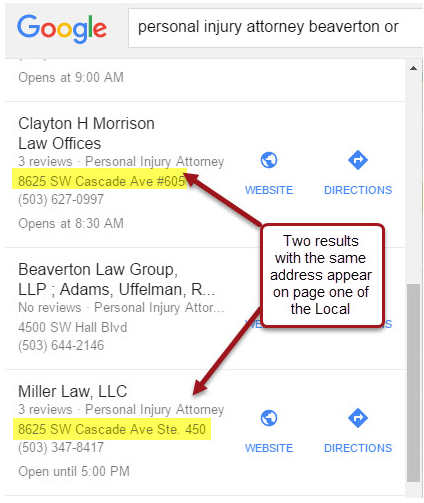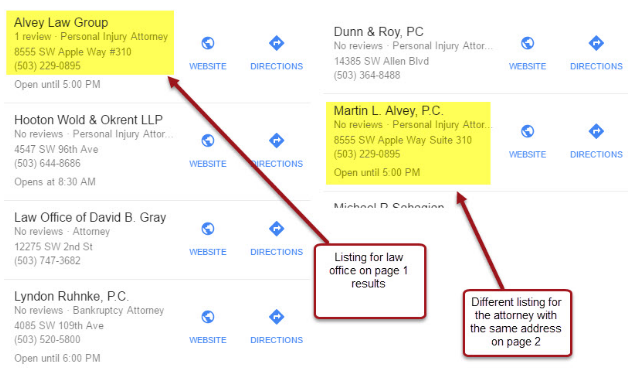Posted by
Tzvi Barish

Possum Affected Local Pack and Google Maps Results
Based on dozens of ranking reports she analyzed, Hawkins said “This is the biggest change I’ve since in local since Pigeon in 2014. I don’t have a single client that wasn’t affected.”
According to Hawkins, Google’s aim with this update is to remove the duplicate and spammy business listings in the Local Pack results. Up until now, in order to increase the diversity of results, Google would filter out local listings that shared the same website domain or phone number. As such, a group of lawyers or practitioners sharing the same website and telephone number would see one or maximum two listings in the local results. With this update, Google is now filtering out listings that share the same physical address as well. This makes it much harder and more expensive to get duplicate listings. Arranging for a different physical address is definitely more involved than getting another website and phone number.
According to the experience of Hawkin’s clients, Google is not only filtering out businesses that share the same physical address, but even businesses that have a different suite number at the same address are being filtered out too.
Hawkins is convinced that Google has some way of recognizing when two businesses are jointly owned because one of her clients is a dentist who owns and operates two separate offices in the same area, will not see both offices listed at the same time within the Local Finder.
Google Isn’t Penalizing Websites For Now
So as of now, this update is not penalizing websites, but Hawkins predicts that this could change if Google sees that the update is not successful in filtering out those who are manipulating the system.
Possum Still Isn’t Air Tight
Saam spoke of his frustration, and that of his clients practicing law in Seattle, noting that a **** site was still successfully ranking in the third position of a local pack for the keyword “dui lawyer in Seattle” even following the update.
I was curious whether Google’s Possum had since caught up with these ***** varmints, and I was pleased to see that indeed it had. I did a search for the same keyword using a VPN from Seattle and not only is the **** site no longer showing up in the local pack but it’s not in the 22 results in the Local Finder either. So the effects of this update, and others, are not all immediate either because they take time to fully roll out or because Google is reviewing the results and tweaking the algorithm as necessary..
In her article, Hawkins mentioned that she had not seen any case where two businesses showed up at the same time if they had the same street address but different suite numbers. In my research I did find two such results on page one of the Local Finder. A search for “personal injury attorney beaverton or” gave me two results with the address “8625 SW Cascade Ave,” but each result had a different suite number.

Two business listings with the same address in the Local Finder
Unfortunately, I think that Google’s Possum needs to be fed some more vitamin-packed veggies because it’s still not managing to filter out even obvious duplicate listings. In the results of the above search, I found two local listings for the same attorney. Both listings shared exactly the same physical address and telephone number but the business name and website address were different. How this slipped by Possum… I guess this is a work in progress…

A business with two listings in the Local Finder, same address and telephone, but different website
Tracking Local Searches Has Never Been More Important
The rolling out of Google’s Possum update only reaffirms the importance of being able to accurately track and optimize websites on Google Maps, Local Packs, and local search results. There is an enormous amount of competition in local search in general, and on mobile searches in particular. As a result, rank tracking and optimizing is essential for a website to gain visibility and bring in business.
Trying to monitor local search results from a particular location is faulty because the search results will be affected by browser personalization and IP, as well as browsing and search history.

